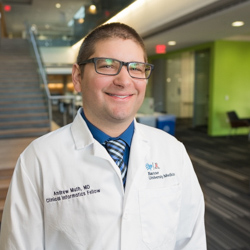UA Fellow Develops Database to Warn Physicians of Possible Drug Interactions for Epilepsy Patients on Ketogenic Diets
A physician-scientist at the University of Arizona College of Medicine – Phoenix has developed a new database to ensure that individuals on ketogenic diets to help treat a certain kind of epilepsy are not prescribed potentially life-threatening medications that contain carbohydrates.

“I wanted to prevent patients with epilepsy on ketogenic diets from unintentionally being exposed to carbohydrates,” Dr. Muth said. “There have been cases where such patients have accidentally been prescribed intravenous fluids that contain dextrose and had adverse outcomes, including breakthrough seizures and status epilepticus.”
In a breakthrough seizure, an individual who has been on a stable regimen of anti-epileptic drugs has a seizure; status epilepticus is a dangerous condition where seizures follow one another without recovery of consciousness between them.
Dr. Muth worked with a multi-disciplinary team at Phoenix Children’s Hospital, including: Mary Babico, PharmD; Lisa Vanatta, MS, RDN, CSP; and Melinda Loya, MSN, RN. The group worked under the supervision of Vinay Vaidya, MD, chief medical information officer at Phoenix Children’s Hospital.
Out of a formulary of about 2,600 medications, the team identified 72 that never should be ordered for someone with epilepsy on a ketogenic diet.
About one-third of newly treated patients with epilepsy have the refractory type, which impacts all ages, but the initial diagnosis and treatment often occurs in childhood when seizures first appear.
Patients follow a ketogenic diet as one treatment option. The diet causes the body to make ketones, which are chemicals made from the breakdown of body fat. In many cases, higher ketone levels lead to improved seizure control, Dr. Muth said.
“Our team came up with the idea for the project after an adverse event involving a child going into status epilepticus after taking a prescribed medication containing sugar,” Dr. Muth said. “We knew we could prevent events like this from happening with the right database in place.”
Developing the database was Dr. Muth’s “quality improvement project” at the UA College of Medicine – Phoenix, where he is a second-year clinical informatics fellow. Clinical informatics fellows work on multiple projects throughout their two-year fellowship. The program’s goal is to develop experts adept at integrating people, processes and platforms to improve the quality, safety and efficiency of health care.
“With informatics, you can treat multiple patients at a time, versus just the patient in front of you,” Dr. Muth said. “You can impact an entire population of patients, plus you are able to impact and improve the workflow for clinicians.”
“Using data and technology to protect and create better care scenarios for our patients is paramount and something we are very proud of here at Phoenix Children’s Hospital,” Dr. Vaidya said. “This effort also further solidifies our renowned Barrow Neurological Institute at Phoenix Children’s Hospital Comprehensive Pediatric Epilepsy Program and our Level 4 National Association of Epilepsy Centers’ accreditation.”
Media Contact:
Teresa Joseph
Phone: 602-827-2657
About the College
Founded in 2007, the University of Arizona College of Medicine – Phoenix inspires and trains exemplary physicians, scientists and leaders to advance its core missions in education, research, clinical care and service to communities across Arizona. The college’s strength lies in our collaborations and partnerships with clinical affiliates, community organizations and industry sponsors. With our primary affiliate, Banner Health, we are recognized as the premier academic medical center in Phoenix. As an anchor institution of the Phoenix Bioscience Core, the college is home to signature research programs in neurosciences, cardiopulmonary diseases, immunology, informatics and metabolism. These focus areas uniquely position us to drive biomedical research and bolster economic development in the region.
As an urban institution with strong roots in rural and tribal health, the college has graduated more than 1,000 physicians and matriculates 130 students each year. Greater than 60% of matriculating students are from Arizona and many continue training at our GME sponsored residency programs, ultimately pursuing local academic and community-based opportunities. While our traditional four-year program continues to thrive, we will launch our recently approved accelerated three-year medical student curriculum with exclusive focus on primary care. This program is designed to further enhance workforce retention needs across Arizona.
The college has embarked on our strategic plan for 2025 to 2030. Learn more.